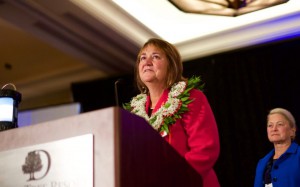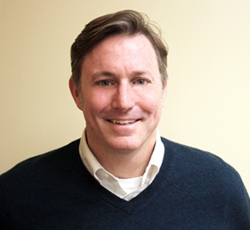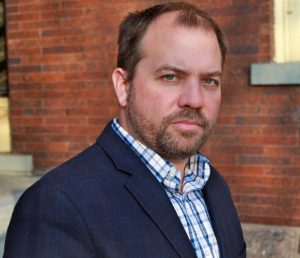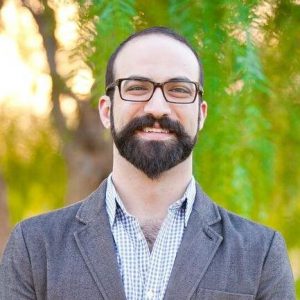
by Steve | Aug 29, 2017 | In the News

Photo courtesy of the Rev. Andrew Wolfe. Floodwaters from Tropical Storm Harvey engulf the home of the Rev. Andrew Wolfe, associate pastor at St. Paul’s United Methodist Church in Houston.
By Shannon Martin and Sam Hodges
Aug. 27, 2017 | HOUSTON (UMNS)
United Methodists ministers have been among those rescued from rising waters in Houston as Tropical Storm Harvey continues to bring catastrophic flooding to much of south Texas.
The Rev. Vincent Harris, a Texas Conference district superintendent, and his wife, Paula, had about a foot of water in their house Sunday when officers of the Klein, Texas, police department knocked on their door and encouraged them to evacuate.
“We felt it was best to go,” Harris said.
They were taken to safety by boat and are spending the night in a family member’s vacant house. Harris noted that he and his wife are veterans of Houston’s chronic flooding, but were unprepared for what Harvey has brought.
“I don’t think anyone thought it would be this bad,” he said. “I’ve been here for 20 years, and I’ve never seen anything like this.”
***
The Rev. Chappell Temple, senior pastor of Christ United Methodist Church, was part of a team that used an ocean kayak to float the Johnson family to safety.
“It was an interesting day,” Temple said. “I thought, `This is our Dunkirk, this civilian flotilla.'”
The Rev. Andrew Wolfe, associate pastor at St. Paul’s United Methodist Church in Houston, lost his home and both cars to the floods.
“We are really close to Bray’s Bayou, and the water rose very quickly,” he said. “The rain and floodwaters have not let up. Everything is our area is flooded from front-door to front-door.”
To read the entire UMNS story, click HERE.

by Steve | Aug 29, 2017 | In the News

Photo by Shannon Martin, Texas Conference. Monique Spell (with paper), a volunteer, consults on Aug. 28 with people who have taken shelter at Faithbridge Church in Spring, Texas. Record flooding in the Houston area, including Spring, caused a number of United Methodist churches to open as shelters for people forced from their homes.
By Sam Hodges
August 28, 2017 | DALLAS (UMNS)
From flooded buildings to pastors and other staff forced to flee their homes, United Methodist churches in south Texas grappled with a ruinous storm that wouldn’t go away.The Rev. Rudy Rasmus of St. John’s United Methodist Church in Houston was among many area pastors who canceled Sunday, Aug. 27, worship services and watched in amazement as floodwaters inundated highways and neighborhoods.
“It’s pretty crazy,” Rasmus said. “I’m 61, and I’ve never seen this in Houston, and I’ve been through maybe 10 hurricanes and three or four major floods. And this is the worst ever.”
As rain continued with no letup seen through mid-week, Texas Conference Bishop Scott Jones confirmed the grim assessment.
“Tropical Storm Harvey has unleashed the worst flooding in Houston’s history, with catastrophic damage,” he said.
Eight deaths related to the storm had been confirmed by Aug. 28. Flood damage was widespread, and included “many” United Methodist churches in the Texas Conference, Jones said.
United Methodist clergy were among those evacuatedfrom their homes by boat on Aug. 27. Other dramas emerged, too.
The Rev. Elijah Stansell, Texas Conference treasurer, was flooded out of his home but worried much more about his daughter. Her pregnancy due date is imminent, and she remains in her Houston home, even as many roads are impassable.
“We’re just kind of praying and waiting,” Stansell said.
The Rev. Benjamin West, who leads the Wesley Foundation at the University of Houston, left with his family after their garage took on two feet of water. They had a long, slow drive to Dallas, and remained there, hoping to get home soon.
“We heard the water got higher last night, but we don’t know how high,” he said on Aug. 28. “It could be anywhere from a few inches in the house to a foot in the house, to nothing.”
To read entire UMNS article from Sam Hodges, click HERE.

by Steve | Aug 28, 2017 | In the News, Perspective E-Newsletter
Before publishing the following commentary regarding complaints filed against Bishop Karen Olevito, Good News reached out to Bishop Grant Hagiya, president of the Western Jurisdiction’s College of Bishops. We asked him if “there [was] any information regarding this matter that [he] could share with us so we can include it in the article? What is the explanation for the unusually long delay regarding resolution or reports on the status of these complaints?”
Hagiya responded as follows: “Due to Judicial Council Ruling 1341, and under advisement of our legal counsel, we dismissed the original complaint without prejudice, and opened up a new complaint submitted in light of 1341 to deal with any issues pertinent to the new ruling.
“A new complaint supervising committee has been formed and will begin working on this new complaint.”
In light of his response Good News decided not to make any changes to the following commentary by our analyst Walter Fenton.
***

Bishop Grant Hagiya, UMNS
By Walter B. Fenton
According to a United Methodist News Service article published one year ago, Bishop Grant Hagiya, president of the Western Jurisdiction’s College of Bishops, said newly elected Bishop Karen Oliveto, an open lesbian married to a UM Church deaconess, “faces multiple complaints under church law.” One year later, and the church has not heard anything regarding the status of the complaints.
While the details of the complaints are confidential, they surely have to do with the fact that Oliveto’s marriage and her admission that she has presided at approximately 50 same-sex weddings constitute serious and serial violations of the UM Church’s Book of Discipline.
According to church law, the status of complaints against a bishop must be reported after 120 days. However, if the parties involved in the matter have not reached a resolution they can request an additional 120 days, and, if necessary, another 120 after that. Apparently, these requests were made, granted, and have now expired. And yet, the Western Jurisdiction’s Episcopacy Committee has failed to issue any report.
Consequently, Oliveto’s leadership in the Mountain Sky Episcopal Area remains under a cloud of suspicion. The episcopal area is comprised of the Rocky Mountain and Yellowstone annual conferences. Both recently reported financial challenges with the latter characterizing its situation as a “financial crisis.” It recently reported monthly revenue losses are ten times higher than they were in 2016. The conference is in jeopardy of exhausting all of its reserves by the end of the year. To be sure, other factors are contributing to these challenges, but Oliveto’s assignment has clearly exacerbated the situation.

Western Jurisdiction Bishops participate in Bishop Karen Oliveto’s consecration service. (Photo by the Rev. David Valera, PNW Conference)
However, it now appears the Western Jurisdiction’s bishops are attempting to indefinitely postpone any day of reckoning for their colleague. They think the church’s sexual ethics, teachings on marriage, and its ordination standards are wrong. While they are certainly entitled to their opinions, their actions – or lack thereof – are raising serious questions about the possibility for church unity and the trust required for it.
What comes of a church when some of its bishops cavalierly decide which laws they will and will not enforce? What comes of church unity when some of its leaders are patronizingly dismissive of values held by the vast majority of United Methodists across a global denomination, and yet continue to draw their pay checks from it? And what comes of trust when bishops give the appearance they are protecting one of their own when it comes to legitimate complaints?

The Rev. Karen Oliveto accepts her election by the Western Jurisdiction as a United Methodist bishop. At the time of her election, Oliveto was the senior pastor at Glide Memorial United Methodist Church in San Francisco, Calif. Her wife, Robin Ridenour, stands behind her. Photo by Patrick Scriven, Pacific-Northwest Conference.
Oliveto’s election came after General Conference had agreed to table all petitions to change the church’s sexual ethics, and after it had authorized the Council of Bishops to appoint a commission to study the matter and present a definitive plan for resolving the long running debate at a called General Conference. Delegates, church leaders, and bishops left the conference with an understanding the church’s teachings on marriage and sexuality remained fully in force while also allowing time for the commission to do its work.
Heedless of all of this, the Western Jurisdictional Conference elected, consecrated, and assigned Oliveto anyway. In response, several bishops issued statements lamenting her election as a breach of the church’s covenant and its unity. The Council of Bishops’ Executive Committee, citing “the great importance of the matter,” encouraged the Judicial Council to take up the matter as soon as possible. And of course many United Methodists regarded her election as an event likely to tip the church towards separation or dissolution.
In short, Oliveto’s election has pushed the church to the brink of division, and its ramifications are taking a toll on worship attendance and giving all across the connection. But despite all of the turmoil it has unleashed, the Western Jurisdiction, which was in such a rush to elect Oliveto, is now stonewalling the complaints filed against her.
United Methodists rightly expect a just and timely resolution of this case. At this juncture, the Western Jurisdiction bishops’ failure to be forthcoming would be indicative of their arrogance and disdain for the wider church.
Walter Fenton is a United Methodist clergy person and an analyst for Good News.

by Steve | Aug 21, 2017 | In the News, Perspective E-Newsletter

Dr. Scott Kisker
By Walter Fenton-
Dr. Scott Kisker’s recent essay on John Wesley, Methodism, and schism begins as so many often do. He quotes from Wesley’s famous sermon On Schism: “It is evil itself.” But just when we think Kisker is setting us up for another lecture on schism’s evils, his piece takes a different and refreshing turn.
Kisker, professor of the history of Christianity at United Theological Seminary in Dayton, Ohio, offers a nuanced consideration of Wesley’s understanding of the church more broadly speaking, the movements and ideas that shaped his ecclesiology, and what ramifications they might have for United Methodists today.
However, before he launches into that portion of his essay, he reminds us what is often overlooked or minimized:
“With [Wesley’s] direct and strong statement against division, it is perhaps surprising that the Wesleyan Methodist tradition has produced as many bodies of Christians as it has, some living still: United Methodist, African Methodist Episcopal, African Methodist Episcopal Zion, Wesleyan Methodist, Free Methodist, Christian Methodist Episcopal, and Nazarene, to name a few, and these only within the confines of the United States. With a global perspective, given the independence of the descendants of British Methodism and the influence of Holiness and Pentecostalism, the divisions are legion. More surprising, given Wesley’s words, than the “schisms” that flowed from our movement is the fact that our movement itself depends on schism, separation, division, for its very existence” (emphasis added).
For Kisker, it simply will not do to cite Wesley’s sermon On Schism and think that settles the matter. He asks a number of penetrating questions with the assumption that the answers will more carefully contextualize the sermon, and so better understand Wesley’s ecclesiology and thoughts on schism. In light of church divisions throughout church history, he asks:
“Where is the church in all this? What is ‘the church’ according to Wesleyan categories? Did these numerous divisions divide the ‘one, holy, catholic, and apostolic church’ or (since Wesley found the Nicene Creed too politically compromised) the ‘holy catholic church’? Were all earlier separations heretical? And which? Was Wesley a schismatic?”
According to Kisker, church unity for Wesley “does not primarily exist institutionally or even ritually in a shared sacrament of the Eucharist,” but rather the “‘oneness’ of the church is a unity through shared experience of the new birth and changed character.”
Wesley, Kisker points out, was certainly shaped by the Church of England and its Articles of Religion, and of course by the long history of the church catholic. However, as the quote above reveals, he was also shaped by Pietism, a movement more proximate to his time and place. And as Kisker notes, for Pietism “true unity in Christ was demonstrated in shared fellowship and missional cooperation across ecclesial divisions. Their ecclesiology acknowledged common cause and care across divisions of doctrine, and practice, yet did not seek to eradicate the divisions.”
As the founder and leader of the people called Methodists, Wesley borrowed heavily from Pietism, which enabled him to create a movement that found root in a variety of settings and able to make common cause with various bodies of believers. In Wesley’s sermon Of the Church, a reflection on Ephesians 4:1-6, Kisker says, he “turn[ed] aside any understanding of the unity of the universal church as primarily institutionally visible, or necessitating connection to one organization.”
To visualize Wesley’s ecclesiology, Kisker invites us to think in terms of a daisy, “with each petal being a congregation, connection, or denomination in which Christians gather. Each petal shares peculiar opinions, modes of worship, and practices of leadership and discipline that distinguish it from other ‘petals.’ The center circle, intersecting all petals, is the true church.” And for Wesley, differences among the petals or even divisions within them, cannot disrupt or fracture the unity of the true church at the center.
Kisker has five thoughtful takeaways from Wesley’ thoughts on schism in the broader context of his ecclesiology. We cannot do justice to all of them here, but suffice it to say that he asks us to do at least four things: (1) gain a deeper appreciation for the various global branches of the Methodist movement, and recognize that schism, separation, and division are a part of the movement’s lifeblood; (2) read Wesley’s remarks on schism in the context of his ecclesiology and the various movements that shaped it; (3) adopt a more humble stance about our place and impact on the church regardless of whether we remain united or separate; and, (4) recognize that “if we cannot hold each other accountable to any coherent expression of Christian ethics, if we cannot agree on explications of the General Rules, we are no longer one church, in the Wesleyan sense.”

We heartily commend Kisker’s essay for reading and studying in local church settings. To read the article, click
HERE.
Walter Fenton is a United Methodist clergy person and an analyst for Good News.

by Steve | Aug 14, 2017 | In the News, Uncategorized
 “To our shame, overt racism is becoming more acceptable in American culture today,” writes Bishop Scott Jones, the United Methodist episcopal leader of the Texas Annual Conference, in his recent pastoral letter. “It is a deep affront to the Greatest Generation that their sacrifice in defeating racist, anti-Semitic Nazism is no longer respected. When Nazi slogans, Nazi salutes and Nazi flags are combined with racist slogans, racist chants and racist flags in public demonstrations Christians must stand up and bear witness to the truth of the Gospel. We must name evil and condemn it before it gathers strength.”
“To our shame, overt racism is becoming more acceptable in American culture today,” writes Bishop Scott Jones, the United Methodist episcopal leader of the Texas Annual Conference, in his recent pastoral letter. “It is a deep affront to the Greatest Generation that their sacrifice in defeating racist, anti-Semitic Nazism is no longer respected. When Nazi slogans, Nazi salutes and Nazi flags are combined with racist slogans, racist chants and racist flags in public demonstrations Christians must stand up and bear witness to the truth of the Gospel. We must name evil and condemn it before it gathers strength.”
The staff of Good News wholeheartedly agrees with Bishop Jones.
Furthermore, we fully support Bishop Sharma Lewis, the episcopal leader of the Virginia Annual Conference, when she states: “We need to stand together as the people of God and have our voices heard. Our witness is lost when we as Christians do not stand up and advocate, especially in times like this. We need to denounce white supremacy, neo-Nazis and the KKK. No race is superior to any other; as Christians we know that all persons are created equal in the image of God. Our baptismal vows remind us ‘to renounce the spiritual forces of wickedness, reject the evil powers of this world and repent of your sin. Do you accept the freedom and power God gives you to resist evil, injustice and oppression in whatever forms they present themselves?'”
Our prayers are with Heather Heyer’s family and friends as they mourn the loss of a young woman killed for opposing a movement that promotes hatred and division. We also pray for the families of the two Virginia State Troopers, H. Jay Cullen and Berke Bates, who died in the line of duty in a helicopter accident as they monitored the mayhem this past Saturday. We mourn with those who mourn.
“The events in Charlottesville this past weekend are only the latest in a long series of warning signs that our on-going fight against racism needs a response and recommitment from all Christians,” concludes Bishop Jones. “Those of us who are white bear a special responsibility to make sure that our sisters and brothers from other races are supported and affirmed in this scary time and they need to know that they are not the only ones that speak up against bigotry and racism. This is a Christian responsibility.”
We join with our fellow United Methodists in the Wesleyan Covenant Association in our commitment to “work for the elimination of hatred, bigotry and prejudice, and to ensure that God’s best is fully available to every person. We proclaim that the life of Jesus is light for all people, that the light shines in the darkness, and the darkness cannot overcome it.”
We encourage United Methodists to take seriously their spiritual discipleship to confront racism, violence, white supremacy, and the unholy misery and suffering unleashed under the swastika. Love wholeheartedly. Pray for peace.

by Steve | Aug 14, 2017 | In the News, Perspective E-Newsletter

James K.A. Smith
By Walter Fenton-
James K. A. Smith, professor of philosophy at Calvin College, has recently sparked a healthy conversation about how the word “orthodox” (literally, “right belief”) is used these days, particularly when it is interjected into the volatile conversation regarding the church’s sexual ethics.
Among several thoughtful responses, Derek Rishmawy, a doctoral student in systematic theology at Trinity Evangelical Divinity School, offered his own gracious and learned response.
Smith pointedly expressed a concern shared by people across the theological spectrum:
“If the adjective ‘orthodox’ is untethered from [Christianity’s historic creedal confessions (e.g., the Apostles’ and Nicene Creeds and the great councils of the early church) that are rooted in Scripture], it quickly becomes a cheap epithet we idiosyncratically attach to views and positions in order to write off those we disagree with as ‘heretics’ and unbelievers.”
Ultimately, for Smith, it is a mistake to assume that just because a Christian affirms or allows for same-sex marriage or the practice of homosexuality, he or she is an unorthodox Christian believer.

Derek Rishmawy
Smith acknowledges that such affirmations cut against the grain of historical Christianity’s understanding of marriage and its sexual ethics, but argues labeling the affirmations “unorthodox” is to confuse the church’s core theological teachings with its ethics. And, as he rightly points out, the great creeds and councils of the church do not venture into a whole host of ethical issues.
His argument is not an attempt to legitimize same-sex marriage or a call to liberalize the church’s sexual ethics, but to caution that a careless use of the term “orthodox” runs the risk of applying it to issues that were never defined as orthodox or unorthodox in the first place.
Again, Smith’s essay is well worth a close read and due consideration. At a minimum, he challenges us to think about the historic understanding of the term and when it is or is not appropriate to use it.
Rishmawy is grateful for Smith’s essays and he acknowledges:
“The matter of sexuality and gender is one of the most controversial questions facing the church today. The conversations are inevitable and necessary, and we must not shirk them. Nor can we take them lightly. As Smith says, how we have these conversations matters. We need to conduct them with the love, grace, charity, and the courage of those whose lives are marked by the confession of God’s forgiveness.”
However, Rishmawy wonders if Smith has drawn too sharp a division between the church’s orthodox beliefs and its ethical standards. He says the church is presently contending with “current movements to normalize and sanction behaviors… that have been scandalous to it for 2,000 years.” So he writes:
“It doesn’t seem that the focus on sexual immorality is out of place, considering the focus it was given in the life of the early church. Consider the first church council, in Jerusalem (Acts 15). One of the first rules the apostles laid down for the Gentiles, in order that they be seen as Christians in good standing, was to abstain from ‘sexual immorality,’ a term which, in first-century Judaism, was largely informed by Leviticus 18, including its proscription of same-sex intercourse. This indicates just how central sexual ethics was to the practice and understanding of the gospel in the first century.
“Similarly, this focus continues in the writings of the Fathers. In fact, the Councils themselves had various canons attached to them which included much moral and ethical instruction beyond the specific definitions and creeds usually associated with them.”
For Rishmawy, an overly drawn distinction between the church’s ethics and its core theological confessions runs the risk of reducing some of its ethical standards to a simple matter of choice, with the assumption that they are not core to who we are as Christ followers. “Let me put it is this way,” he writes:
“Given this limited view of the term orthodoxy, it would be a coherent statement to say, ‘Joe is an orthodox Christian who believes adultery can be Christian behavior.’ Or, ‘Joe is an orthodox Christian who believes bearing false witness can be Christian behavior.’ Or, ‘Joe is an orthodox Christian who believes coveting can be Christian behavior.’ None of those statements is incoherent if ‘orthodox’ just means ‘formally aligns on key Nicene and Chalcedonian propositions.’ Yet it’s obvious in each case, somewhere Joe is severely out of line with the gospel (emphasis added).”
Both essays remind us how important it is for the church, from the sermon to the Sunday school class to the mission project, to constantly explore the nexus between our doctrine and the daily practice of our faith.
To read Smith’s essay and Rishmawy’s response, click HERE and HERE.
Walter Fenton is a United Methodist clergy person and an analyst for Good News.









 “To our shame, overt racism is becoming more acceptable in American culture today,” writes Bishop Scott Jones, the United Methodist episcopal leader of the Texas Annual Conference, in his recent
“To our shame, overt racism is becoming more acceptable in American culture today,” writes Bishop Scott Jones, the United Methodist episcopal leader of the Texas Annual Conference, in his recent 
